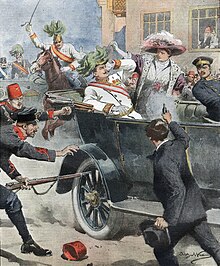On June 28, 1914, Franz Ferdinand, the heir to the Austrian Empire, was visiting the people of Sarajevo, Bosnia. Bosnia was part of the south-east part of the Empire. Some citizens in Austria, especially is Sarajevo, wanted to be free citizens and escape the control of the Empire. The also wanted to set up their own state which could run itself without the control of other European empires. Before leaving his home, the heir had been warned that his presence in this part of the Empire may provoke some anger throughout the citizens of Sarajevo. However, he went regardless of the risks. He travelled in an open-topped car, which at the time was fairly common. At the start of his royal tour of the city, one of the cars in his entourage was hit by a grenade. One of the Austrian officers in it had been injured. Franz decided to change the route at the last minute because he wanted to see the injured officer in the hospital. Sadly, the driver got lost because he did not understand the directions. [1] When he stopped to check where he was, the driver realized he had taken a wrong turn, and backed out onto the Main Street. By purely bad luck, he stopped right by a man named Gavrilo Princip. Princip was a member of the Black Hand Gang, an organization that wanted to free Bosnia from Austrian rule. Additionally, he was behind the grenade throwing from earlier that day and was now attempting to disguise himself among the crowd so the police would not find him and arrest him. When he spotted the car, he couldn't believe his luck. He took out a revolver he had on his person and shot Franz and his wife. As a result, both of them died. Austria blamed the murder on a country called Serbia. This country was near to Bosnia and had encouraged the Black Hand Gang by giving them their armory and weapons. They had made an alliance with them because they wanted to unite with Bosnia to form a new Balkan state. Austria decided that Serbia must be punished and they prepared for invasion. They would be able to easily defeat it because their army was so small. When Serbia learned of this, the called on Russia for help. Now it was harder to defeat Serbia because their army was significantly larger than Austria’s. Austria knew it could not defeat both countries without some help, so they asked Germany for help. Germany agreed; their response provoked France to volunteer as well. Meanwhile, unbeknownst to anyone other than the German government, the German army had forged the Schlieffen Plan. This plan was named after a senior German army officer who believed that his army was superior to those of anywhere else in Europe. However, he also believed that they could not fight a war on the two fronts of Russia and France. He thought that the huge Russian army would take at least six weeks to get organized. He figured in that time, Germany could take down France and send their army across Europe to fight the Russians. This plan was accepted by the German High Command. Unfortunately, it had one problem. It depended on the French and the Russians’ actions. Instead of controlling a situation, Germany had to react to one. So when France called up its army, Germany had no choice but to carry out this plan. To do so, it involved an attack on France through attacking Belgium. This was risky, because in 1839 Britain had guaranteed Belgium that if anyone attacked it, Britain would attack the attacker. When Germany invaded Belgium, Britain declared war on Germany. They were supported by France and Russia. Germany was supported by Austria. Italy was not involved (yet). [2] All of this meant that week's after the assassination in Sarajevo, five out of the six countries that had signed two peace treaties were on the brink of being at war with each other. This was only the beginning of a long war.

